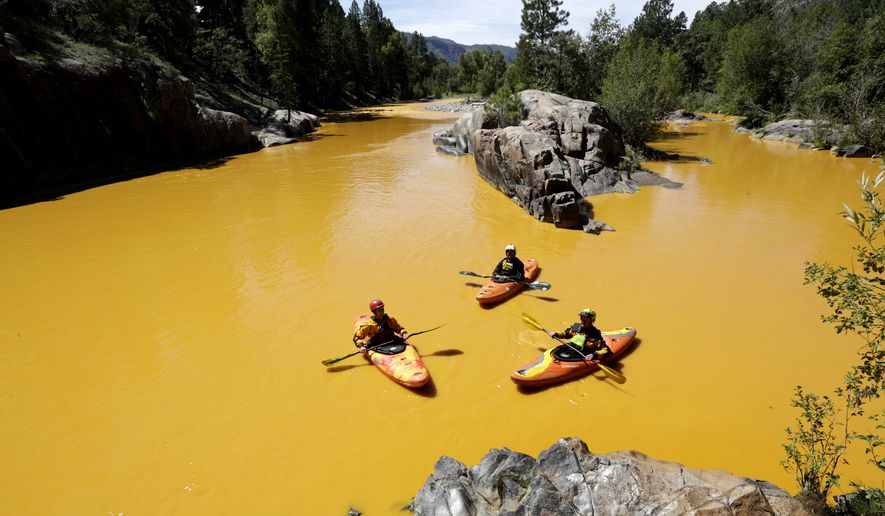The political fallout from last week’s toxic spill at Colorado’s Gold King Mine intensified Monday, with critics saying the incident has exposed clear hypocrisy within the Obama administration while threatening the credibility of the Environmental Protection Agency at a crucial moment.
Rather than express outrage as it has done in the wake of previous environmental disasters, the White House would not comment on the spill and instead directed all questions to the embattled EPA.
The agency, meanwhile, remains under intense fire after its contractors accidentally breached a dam at the mine last week and sent toxic sludge flowing into the Animas River. The contaminated water has spread to New Mexico, Arizona and Utah, and EPA officials were forced to concede that more than 3 million gallons were released into the river — a much higher amount than the agency’s initial estimate of 1 million gallons.
The fluid contains lead, arsenic and other heavy metals.
Although not comparable in magnitude, the spill in some ways is reminiscent of BP’s 2010 oil spill in the Gulf of Mexico, which famously led President Obama to say he was looking for someone’s “ass to kick” in response and prompted Ken Salazar, the interior secretary at the time, to vow to keep his “boot on the neck” of BP.
This time, with a federal agency responsible for the spill, the talk hasn’t been so tough.
PHOTOS: See Obama's biggest White House fails
Critics say the administration is exercising a clear double standard by failing to demand the kind of accountability — including the firings of those responsible — that it has demanded of private companies.
They also say the EPA has seriously damaged its own credibility by failing to reveal the incident until a day later, and by initially downplaying the size of the spill.
“Their response has been terrible. They’ve hedged the truth, if you will, which puts people in jeopardy because it turns out it’s much worse. They’re doing precisely the sorts of things they level charges at other people for doing,” said Dan Kish, senior vice president for policy at the conservative Institute for Energy Research.
“It’s ironic in a lot of ways because, typically, when big, iconic things happen like this, they spend a huge amount of time trying to throw gasoline on the fire,” Mr. Kish said. “They always tell us they’re right, everybody is wrong. In this particular case, they’ve got their hands full.”
The spill has prompted threats of lawsuits from American Indian tribes and others who say the EPA must be held accountable for damage to the environment. Lawmakers on Capitol Hill also want answers from the agency, which has admitted full responsibility for the incident and has begun a mammoth cleanup effort.
“It has been five days since the spill and the EPA has failed to answer important questions, including whether the polluted water poses health risks to humans or animals,” said Rep. Lamar Smith, Texas Republican and chairman of the House Science Committee. “It is concerning that the agency charged with ensuring that the nation’s waters are clean is reportedly responsible for the toxic water spill at Gold King Mine. A spill of this magnitude could be devastating for the families who live nearby and depend on the Animas River in their daily lives.”
PHOTOS: Double Take: Celebrity look-alikes
The EPA says it’s still investigating the potential health risks.
The environmental disaster happened just a week after the EPA released its Clean Power Plan, the centerpiece of the president’s broader climate change agenda. The proposal is designed to limit carbon emissions from power plants.
The EPA in the past few months also has released a host of regulations to protect U.S. waters, including rules specifically aimed at limiting pollution and toxic runoff from mines.
Analysts and former EPA officials say agency critics now will have ammunition against those proposals, largely because the administration botched its response in the immediate aftermath of the spill.
“If you’re forthcoming and you come out and say, ’There’s an accident; we’re doing everything we can,’ that extra day meant a lot to people. I think it was a series of mistakes and misjudgments,” said Charles Warren, chairman of the environmental group at the law firm Kramer, Levin, Naftalis & Frankel and a former regional administrator with the EPA.
“In this kind of climate, with all of these issues that people in Congress have with EPA, this is just another way to beat up on them,” he said.
Moving forward, the federal government surely will spend millions of dollars — and perhaps much more — to clean up the spill. Opponents of the administration’s environmental agenda say the consequences should be even more serious.
“There is probably criminal negligence that’s gone on here,” said Michael McKenna, president of the lobbying firm MWR Strategies and a former Energy Department official. “It’s serious, and the thing that concerns me is the EPA is minimizing this.”
The EPA will have no special legal protections. The agency could be liable for any damage to water and land and could be sued if anyone in the affected area develops health issues related to the incident, said Kenneth von Schaumburg, a lawyer at the Washington firm Clark Hill and deputy general counsel at the EPA during the George W. Bush administration.
“The liability for the spill — sure, it’s theirs. Are we strictly speaking about damages to the environment, are people getting sick? That would be an extension of it,” he said. “They’re just like anybody else. They don’t get any special protections.”
Mr. von Schaumburg added that lawmakers should avoid citing the spill as they criticize Mr. Obama’s climate policies.
“The Clean Power Plan should be disconnected from this,” he said.
• Ben Wolfgang can be reached at bwolfgang@washingtontimes.com.




Please read our comment policy before commenting.